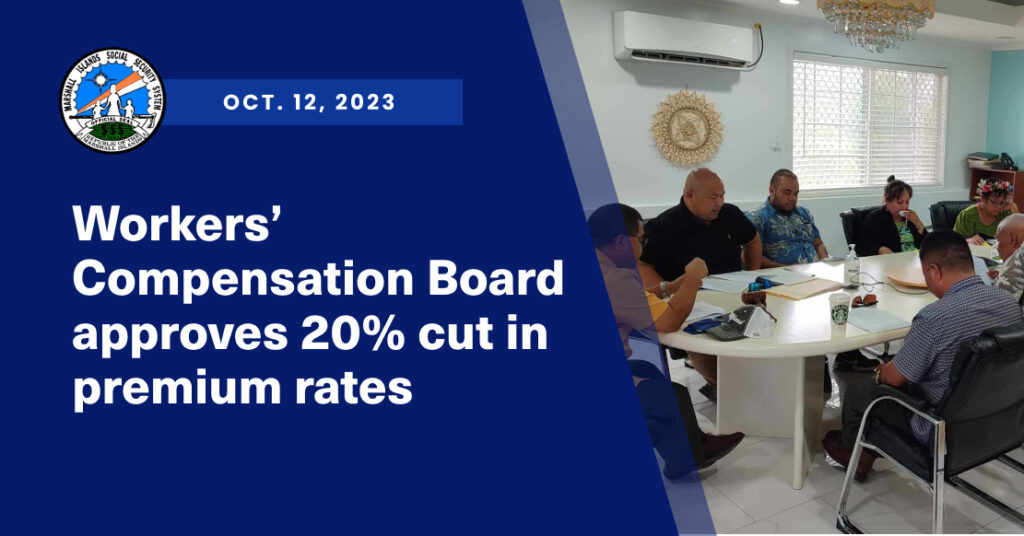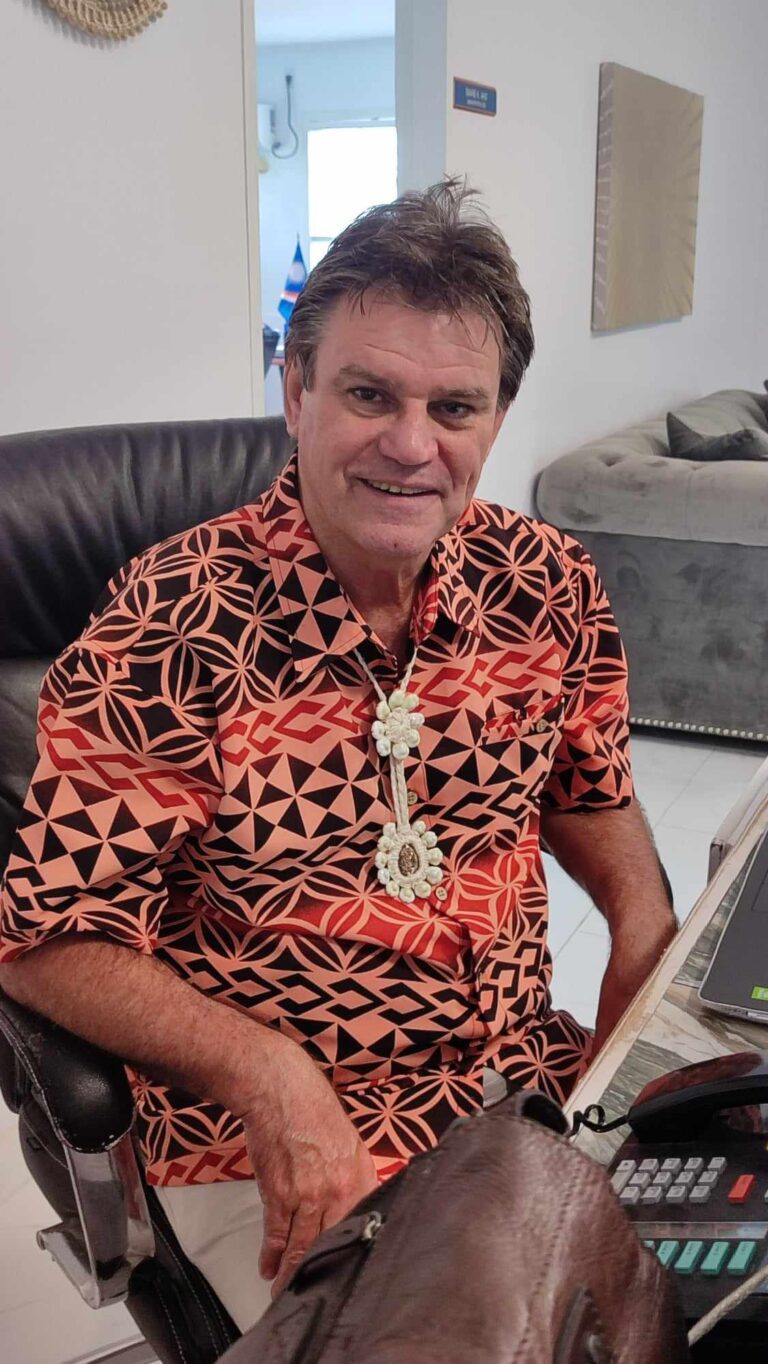Published 12 October 2023
Workers’ Compensation Board approves 20% cut in premium rates

During its meeting today (Oct. 12, 2023), the MISSA Board (a.k.a. Workers’ Compensation Board) approved the offer from the two participating insurers, for a 20% reduction in the premium rates for Workers’ Compensation insurance coverage, to take effect retroactive to October 1, 2023 and remain in force for two years (until 30 September 2025).
The RMI Workers’ Compensation Law, which took effect on 1 October 2023, was patterned on the CNMI Workers’ Compensation Program and the current premium rates being adopted by the two local insurance agents, Moylan’s Insurance Underwriters, Inc. and Marshalls Insurance Agency (MIA) are the same rates that are currently used in CNMI. There were concerns raised in the Marshall Islands Journal that the insurers were not co-operating and that employers were being unreasonably burdened with higher workers’ compensation insurance costs. In response, MISSA’s Adviser, Mr Adrian Nippress responded:
The RMI Worker’s Compensation Act 2019, while based on CNMI law, is not “entirely copied and pasted”, rather the RMI Worker’s Compensation Task Force consulted widely (with over 200 individuals and 60 different employers on Majuro and Ebeye) and obtained a significant number of amendments passed by the Nitijela this year to make the law more applicable to the Marshall Islands’ employment context. This includes a substantial benefit of opportunities to seek self- insurance (unlike in CNMI) arrangements.
As employers are required to pay for the full cost of insurance, to allow compensation payments to be made to injured workers, MISSA engaged an independent Actuary – Deloitte Australia last year, to review insurance-claims related data and likely costings and provide recommendations for various rates of insurance premiums across the main industry types. After the actuarial study was completed, Deloitte recommended a substantial cut to the private sector worker’s compensation insurance premiums on RMI, by using CNMI rates as the standard (100% measure).
However, the two local insurance carriers contested the substantial recommended cut and reasoned the actuary may have overcompensated regarding the impact of the cost of local treatments, which are subsidized by the RMI government and are much cheaper than in CNMI, and the overseas medical referral program that is also being subsidized by the Health Fund. Although there is a $40,000 cap on wage-related benefits covering death, temporary and permanent disability, the reimbursement for the WorkComp Adviser Adrian Nippress cost of treatment, medical expenses and rehabilitation has no such limits. One serious work-related injury may require treatment which costs well beyond the $100,000 limit set by MoHHS for overseas treatment. E.g., several years ago, there was a worker’s compensation claim in CNMI requiring $4 million in costs by one of the insurance carriers.

It is also important to note that the current insurance premium rates in CNMI have remained unchanged since the late 1980s when the minimum wage during that time was only $2.50 an hour. Furthermore, the working environment of RMI compared to CNMI or Guam is not the same. Both CNMI and Guam businesses are required to follow USA based OSHA (Occupational Safety and Health Administration) standards which was established principally to prevent or mitigate workers’ injuries and diseases by implementing safe working environment for employees including compulsory use of PPE (Personal Protection Equipment) which until recently, did not exist in RMI. Non-OSHA compliance results in thousands of dollars in penalties.
MISSA, through their Adviser, Mr Adrian Nippress, initiated a teleconference late last week, to facilitate a better outcome between the insurers and the Majuro and Ebeye Chambers of Commerce. The outcome was a significant improvement for all RMI businesses in that the insurers agreed to offer to businesses in the Republic of Marshall Islands over the two-year period from 1 October 2023 – 30 September 2025:
- There will not be any increases to RMI worker’s compensation insurance premiums over this 2- year period, despite inflationary pressures and higher premium rates in other parts of the Pacific region
- Give a 20% reduction from last year’s worker’s compensation insurance rate in the Marshall Islands. I.e. to only 80% of the current CNMI rates
- No limit on medical/rehabilitation expenses (previously limited to $10,000 by Moylan’s in RMI) to be reimbursed as part of an approved worker’s compensation claim. These expenses would mainly be associated with any off-Island treatment which increases options for injured workers
- Minimum policy cost for worker’s compensation insurance will be reduced so that the insurers will offer to small businesses (with low risk) coverage for all of their staff insurance premiums for $150 (Moylan’s) or $200 (MIA) in total per year. Such policies provide full cover/entitlements under the RMI Worker’s Compensation Scheme and based on MISSA business data will benefit around 70% of the 835 RMI employers who employ less than 4 workers.
Currently, more than 60 employers have already insured their employees as required by the new Worker’s Compensation Act 2019. The Workers’ Compensation Administration appreciates their commitment to providing protection for their staff and encourage all other employers to register in the new Scheme by obtaining insurance before 31 October 2023 – when fines may start to be applied.
Whether or not fines are imposed to those employers who have not obtained insurance coverage for their workers by October 31, 2023, the liability of employers for any claim that occurs still remains. Mr Nippress advised that:
“Employees now have a legally enforceable right to claim compensation for lost wages as well as medical and rehabilitation expenses, even if their employers have not yet covered them with workers’ compensation insurance. This new employment right applies to all residents of the Marshall Islands, irrespective of how they are employed.”
Recent Posts
- MISSA sues company for refusal to pay worker’s compensation and death benefits for worker involved in fatal accident
- Request for Proposals (RFP) For Investment Advisory Services
- MISSA’s Investment Committee to start more proactive oversight of the Retirement Fund
- 6 new MISSA Board members appointed by Cabinet
- Market value of MISSA’s foreign investments up by $10.5M in 2023